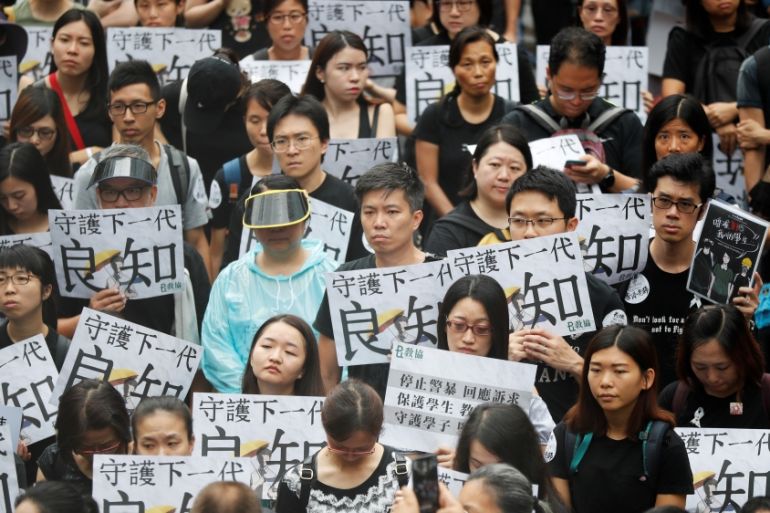‘Protect the students’: Hong Kong teachers join protests
Ahead of a new school year, teachers raise concerns about their students’ safety amid ongoing mass protests.

Hong Kong – Thousands of teachers braved hot, stormy weather on Saturday to march through downtown Hong Kong to denounce perceived government inaction and alleged police brutality against students protesting against the city’s extradition bill crisis, now pushing into its eleventh week.
Carrying umbrellas to battle vacillating heat and rain, teachers streamed up a main highway and snaked through a park chanting “protect the next generation of students!”
Keep reading
list of 4 itemsHong Kong’s new security law comes into force amid human rights concerns
Hong Kong passes tough new national security law
What is Article 23, Hong Kong’s new draconian national security law?
The protest began at a park called Chater Garden in downtown Hong Kong and was planned to end at the home of the city’s embattled leader Carrie Lam, but was redirected by police.
“As a teacher, we have to show our support to them,” said Carina Ma, a secondary school English teacher in her forties, who was marching on Saturday.
“If the teachers are not the role models to stand against the brutality and violence, we cannot teach our students well. So we must come out and stand up for them.”
The mood was both determined and angry, with some marchers waving their signs in front of police and chanting “Free Hong Kong!”
Teachers are the latest sector of society to join widespread demonstrations that have rocked the Chinese territory since early June.
What began as a protest against a now-shelved extradition bill that would allow suspects to be sent to mainland China has swelled into wider fury over Chinese interference into the affairs of the semi-autonomous territory.
While protesters have been demonstrating for nearly three months, the Beijing-backed government has refused to concede on any of the protesters’ five main demands, which include universal suffrage, full retraction of the bill, and amnesty for all arrested protesters.
Most demonstrations have been peaceful, but come nightfall fringe groups have often been seen clashing with police, triggering tear gas-filled chaos in the streets.
In the Mong Kok district on Saturday night, a second protest devolved, with black-clad protesters surrounding the police station, flashing laser pointers and throwing eggs at police.
Police fired a single rubber bullet after a protester threw a garbage bin onto a police van from a footbridge as the crowd dispersed.
Hong Kong police said on Thursday they had arrested at least 748 people since the protests began.
‘They feel really hopeless’
English teacher Ma said she was concerned for the safety of her students as well as their wellbeing, especially with the new school year approaching.
“I think most of them cannot focus in the lessons. They are so confused and angry and emotional,” she said, noting that many are dealing with political disagreement within their families. “At school, if we can’t make them feel supported and [listened to], they really feel hopeless”.
Ming Lam, 34, a clinical instructor, echoed the concerns.
“Definitely I worry about their studies because they spend much time fighting for Hong Kong freedom and democracy,” said Lam, fanning a baby strapped to her chest.
She said she also worried about her students being able to safely get to classes in different hospitals on weekends amid tear gas and roadblocks.

Academic Kristof Van den Troost said he feared what the “government is doing to Hong Kong” amid the ongoing protests.
“[We] keep going on even though the pressure is very high to stop and give up, because everything feels so hopeless,” said the 37-year-old Belgian native, who has lived in Hong Kong for 14 years.
“Things are quite nervous at the moment. We expect that there will be tensions on campus soon because the school year is going to start. Things are going to be very turbulent.”
Pro-government rally
Meanwhile, across the harbour on Hong Kong Island, a pro-police demonstration unfolded early on Saturday night in the waterfront park outside the legislative council building.
Thousands of government supporters streamed into the park, brandishing Chinese flags, giving thumbs-up to policemen, and taking pictures with the officers. Some wore light blue “I love HK police” t-shirts.
“[Hong Kong] is a mess. The rioters have gone beyond the line already,” said CS Ho, a 67-year-old lawyer and engineer.
“No matter how much we disagree with the government … [saying] ‘I disagree, I can do whatever I like.’ This is not rule of law.”
Ding Ding, a 50-year-old manager in commerce, said the people “need to protect Hong Kong”.
“We object to any violence. We are very angry. I’m one of the silent majority. We don’t want to come out and join any protests. We don’t like the protests going on. We want to keep Hong Kong peaceful,” said Ding.
Ding Ding called the recent airport protest where two mainland Chinese men were allegedly tied up and beaten by demonstrators “disgusting”. “This is not Hong Kong. They are not representing us.”
Police said about 100,000 people attended the pro-government rally.
‘Threats’ from Beijing
Beijing has also ramped up its rhetoric, saying the protests were showing signs of “terrorism” and releasing images of troop build-ups across the border in Shenzhen.
But some Hong Kongers remained unperturbed. “I don’t believe the Chinese government will do anything,” Lam said. “I think it’s only a threat”.
Van den Troost agreed that Chinese military intervention seemed unlikely. “It would be bad for China itself,” he said. “The main thing for Hong Kong is to stick to non-violent protests because we don’t want to give the mainland government an excuse to come here.”
“It’s always a possibility. During June 4, 1989, people didn’t expect that the army would crack down and they did, so you never know,” he said, referring to the iconic Tiananmen Square incident in Beijing.